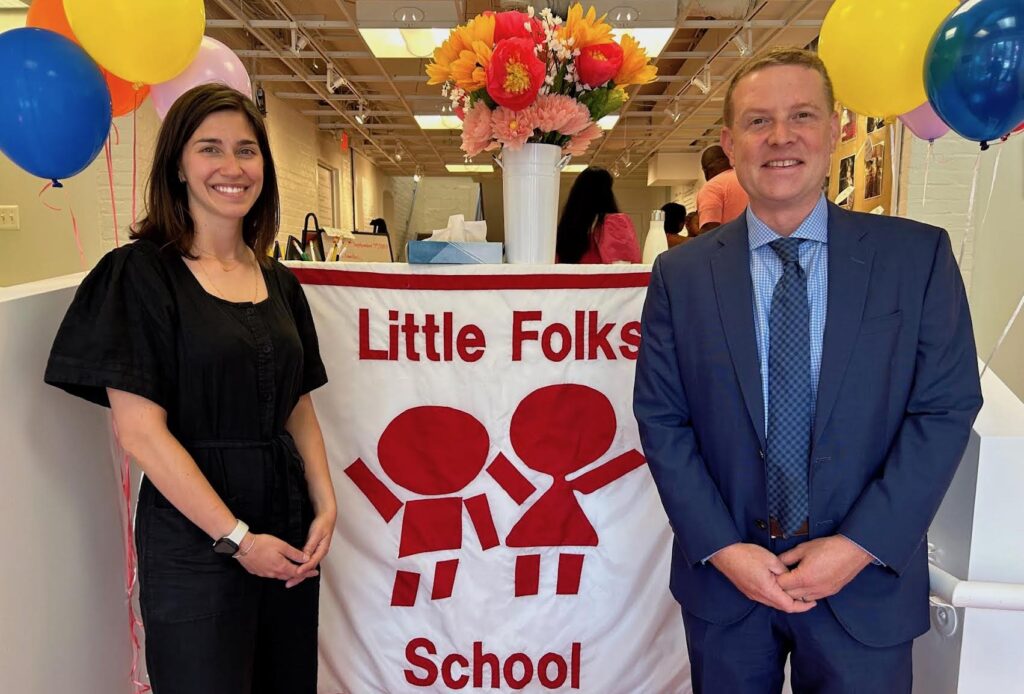A 50-Year-Old Pre-School in Georgetown That’s Different
By • September 5, 2023 0 2739

A lot of big folks in Georgetown used to be little folks at the Little Folks School at 3247 Q St. NW. It is 50 years old this year and a few of the staff have been with it almost since its start when it is was located on M Street. Old staffers remember the big folks who are now bringing their little folks to the school.
Head of School James Gilroy says he stays in touch with the beloved Gay Cioffi, who was the Director of the Little Folks School for 38 years. For its 50th anniversary, the school honored Cioffi with her own scholarship fund — the Gay Cioffi Scholarship Endowment Fund — so that she can continue championing early childhood throughout her life.
As for the school today, Melanie Douglass, Director of Programming, says, “We are full up with a waiting list – many who are second-generation students and parents, and balanced in gender and age.”
Yet the popularity of the school doesn’t seem to be just due to alumni. This school is different. It feels different from the minute one walks in, although at first it is not clear why.
Upon entering the school, it was busy, of course — full of energetic little adorables between the ages of potty-trained 2.5 year-olds and 5. All were coming and going and busy in almost a dozen class rooms of different sizes and configurations, each with an identified color and room traditions built-up over the years. That’s where the differences begin to be seen. For the maximum number of students in a room is no more than 12. And the number of “instructors” in each room at a time — usually no less than three. All the classes are mixed aged – all have 2-to-5 years olds. “My daughter told me today proudly and happily that she has two young partners,” one teacher said.
Yes, they were busy, but not as in a hectic busy sense, running from one table of paint, say, to another with toys or blocks or color crayons, focusing just minutes on one thing. Rather the “little folks” seemed to be involved, engaged, even focused on a single project together in the rooms. “That’s because we orient our day to where the children are,” Douglass explains. “To what is engaging them when they come in or talk about in our opening day engagements.”
For instance, one day there were bees outside the building when the children came to school, one of the teachers recalled. Everyone was talking excitedly about the nest nearby. “So, we got into a whole day of bee activities — finding out about hives and queen bees and if and when they sting,” she says. “We could explore the subject with questions and talking and reading and art and even attracted bees and numbers – how many we saw and where.”
“Every day is like that,” Douglass says. “There is no set schedule.” Teachers share ideas that come up, guide the children’s energies and interests creatively into problem-solving projects that utilize math and vocabulary, crayons and paint (sometimes with coffee!), play acting and sign language, and going outside or crafting something in the mud table in the school’s back courtyard (all students bring a change of clothes) or finding a book in the library or finding different ways and places to share a book.
In fact, the classrooms are not full of books. “We found that stacks of books in a room took a lot of time to keep in order, maintain, protect — spending children’s time doing that rather than going to the library and spending the time with selected books in a shared or individual activity,” she says. All the while, the teachers incorporate learning skills in using numbers and visual tools, sounds and words, often ending up with a project out of clay or papier-mâché, paper or even their own book or self-portrait.
“The school can’t be labeled as one technique or ideology,” Douglass says. “It is comprehensive. The main goals is to engage all the senses in a subject of interest, where they are, the environment that is happening at the moment. Above all, it’s flexible and neither the children nor the teacher quite knows what is going to happen that day, other than they will probably learn something new and have active fun doing it.”
That’s what makes the Little Folks School different. And what keeps the former little folks who grow up to be big folks, bring their own little folks there.
For information about Little Folks School go here.

